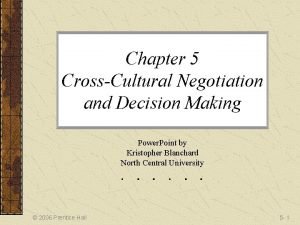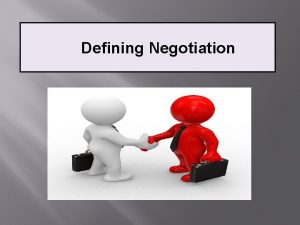Managing negotiation Helen Peng 01 Contents Understanding Negotiation

















- Slides: 17

Managing negotiation Helen Peng

01 Contents Understanding Negotiation Pre-conditions, Elements, Assumption of Negotiation

UNDERSTANDING NEGOTIATION WE DO NOT GET WHAT WE WANT IN THIS LIFE WE GET WHAT WE NEGOTIATE. — GARG KARRAS • A negotiation takes place every time when two or more people are communicating and at least one has goal in his mind. Negotiation is intended to influence others’ behavior. We constantly negotiate consciously or unconsciously. • We negotiate to resolve conflict and solve problem in our favors. • Not much of importance is attached with negotiation in our day-to-to day life, because it becomes routing. But it assumes more importance in business and political fields…. negotiation is more strenuous and more difficult than the process of war. • Negotiating is a means of getting what you want from others. It is back and forth communication designed to reach an agreement when you and other side have some interests that are shared and others that are opposed. • In journey of our lives, we negotiate at every step to achieve success both in our personal and professional lives.

UNDERSTANDING NEGOTIATION • Definition and scope Negotiation is an interpersonal decision-making process necessary whenever we cannot achieve our objectives single-handedly. Whether simple or complex, negotiations boil down to people, communication, and influence. Thus, the scope of negotiation ranges from one-on-one to highly complex multi-party and multi-nation interactions. Somehow the term “Collective Bargaining” and “Negotiation” have been often used synonymously. Negation is a process for resolving conflict between tow or more parties whereby both or all modify their demands to achieve a mutually acceptable compromise. *Negotiation can be characterized as: 1. An explicit and deliberate event; 2. It takes place between the representatives of parties concerned; 3. The process which intends to settle the disputes/differences between the parties involved; 4. The outcome of the negotiation is dependent (party) on the relative power relationship between the parties involved.

UNDERSTANDING NEGOTIATION The Prevalence of Negotiation • Sometimes we negotiate several times a day also, though we don’t realize doing so. • Labor disputes are far more visible and get extensive news coverage than commercial disputes which are as frequently but public and visible. • Negotiated settlement for marriage between the parents of prospective couple for the size of dowry, has been a common practice and far more decisive factor than the compatibility of the prospective partners. Now negotiation has become quite common and effective in divource settlements. • We are forced to negotiate because we are not fully in control of events.

UNDERSTANDING NEGOTIATION • The right to differ is regarded in democracies as a fundamental right. Negotiating may not work in certain circumstances, necessitating finding other way outs. There alternatives to negotiation which are appropriate and sometimes even preferred to suit the circumstance. 1. Dictatorship is one of the alternatives to negotiations, which is even preferable in certain circumstance. 2. In military orders are not subject to negotiation; in sports the referee’s decision is final, through a player does not lose the right to challenge it risking punishment. 3. A solution can be hit through arbitration, if negotiation fails to produce one. 4. Pendulum arbitration Is more common. 5. The most common alternative negotiation is persuasion.

Negotiating Conflicts • The right to differ and have one’s own viewpoint is an integral part of a democracy…. As a result both the parties waste hours and days together fruitlessly arguing repeating the same ground instead of negotiating to achieve a workable compromise. • One of the major causes of conflict is differing perceptions. …People negotiate because of self interest, be it corporate or personal. It is not always possible to resolve conflict by negotiation. • Agreeing to disagree will not make the problem go away where the differences affect or are part off a work or commercial relationship. • In the negotiating context, the conflict can be of two kinds: 1. Conflict of interest and 2. Conflict of rights **Negotiations as a process for conflict resolution necessarily centers on which the two parties are in conflict and not their relationship in total.

• Need and Importance of Negotiation: Five key reasons to illustrate the importance of negotiation skills: 1. Dynamic Nature of Business 2. Interdependence 3. Competition 4. Information Age 5. Globalization: Most managers must effectively cross cultural boundaries in order to do their jobs. Setting aside obvious language and currency issues, globalization presents challenges in terms of different norms of communication. Managers need to develop negotiation skills that can be successfully employed with people of different dnationalities, backgrounds, and styles of communication.

PRE-CONDITIONS FOR NEGOTIATIONS 1. Having either conflict or disagreement 2. Perceiving conflict of needs, positions and interests 3. There must e interdependence so that outcome must be satisfying to all parties 4. Agreement must be required to be reached within reasonable time, so that it becomes beneficial to parties. 5. The success of negotiation depends on the facts that: a. The issue is negotiable b. The negotiators are not only taking but giving also c. The negotiator’s parties must trust each other to some extent d. There is a fear that failure may lead to crisis

UNDERSTANDING NEGOTIATION Need and Importance of Negotiation Five key reasons that illustrate the importance of negotiation skills: 1. Dynamic Nature of Business 2. Interdependence 3. Competition 4. Information Age 5. Globalization

ELEMENTS OF NEGOTIATION

ASSUMPTION OF NEGOTIATION EFFECTIVE NEGOTIATION IS BASED ON FOLLOWING ASSUMPTIONS • Negotiation is process of give and take. • Negotiation provides reasonable people a reasonable opportunity to be reasonable. • Both parties come with the belief that the other individual/group can be persuaded. • The assumption has to do with the hierarchically equal status of the parties during negotiation. • It is assumed that the parties in conflict have assessed other alternatives and have found negotiation as a more valuable option than the others.

CONCLUSION • Negotiation is like a war in peace. Negotiation is a battle of the minds “but any effort to win over the hearts has tremendous effects on the outcome” Negotiation is a Dance Negotiation is an ongoing dance. The dance floor is life itself. A dance is a sequence of shifting steps. The worst form of negotiation is to stay stuck in your place. It is not negotiation, but intimidation. There are two critical steps in negotiation-trust and test. (1) Trust is a shared awareness of each other’s needs, comfort zones and capabilities. (2) Testing is about choreography. Partners must learn to orchestrate how they can dance together without stepping on each other’s toes. • **A does of trust, a dash of test and now you are ready for the twist. That’s all required for win-win negotiation.

Managing conflict Part I

Managing conflict Part I

Managing conflict Part I

Managing conflict Part I
 Helen peng age
Helen peng age Helen peng
Helen peng Helen midtown computer solutions helen speaking
Helen midtown computer solutions helen speaking Helen midtown computer solutions helen speaking
Helen midtown computer solutions helen speaking Managing negotiation
Managing negotiation Conflict in psychology
Conflict in psychology Managing clinical risk
Managing clinical risk Understanding work teams
Understanding work teams Chunyi peng
Chunyi peng Peng-robinson equation of state
Peng-robinson equation of state Peng
Peng Memudaratkan
Memudaratkan Stabelaryzowane
Stabelaryzowane Ut san antonio
Ut san antonio Elise brown oakland university
Elise brown oakland university Persamaan redlich kwong
Persamaan redlich kwong Bo peng kaggle
Bo peng kaggle Peng
Peng
































